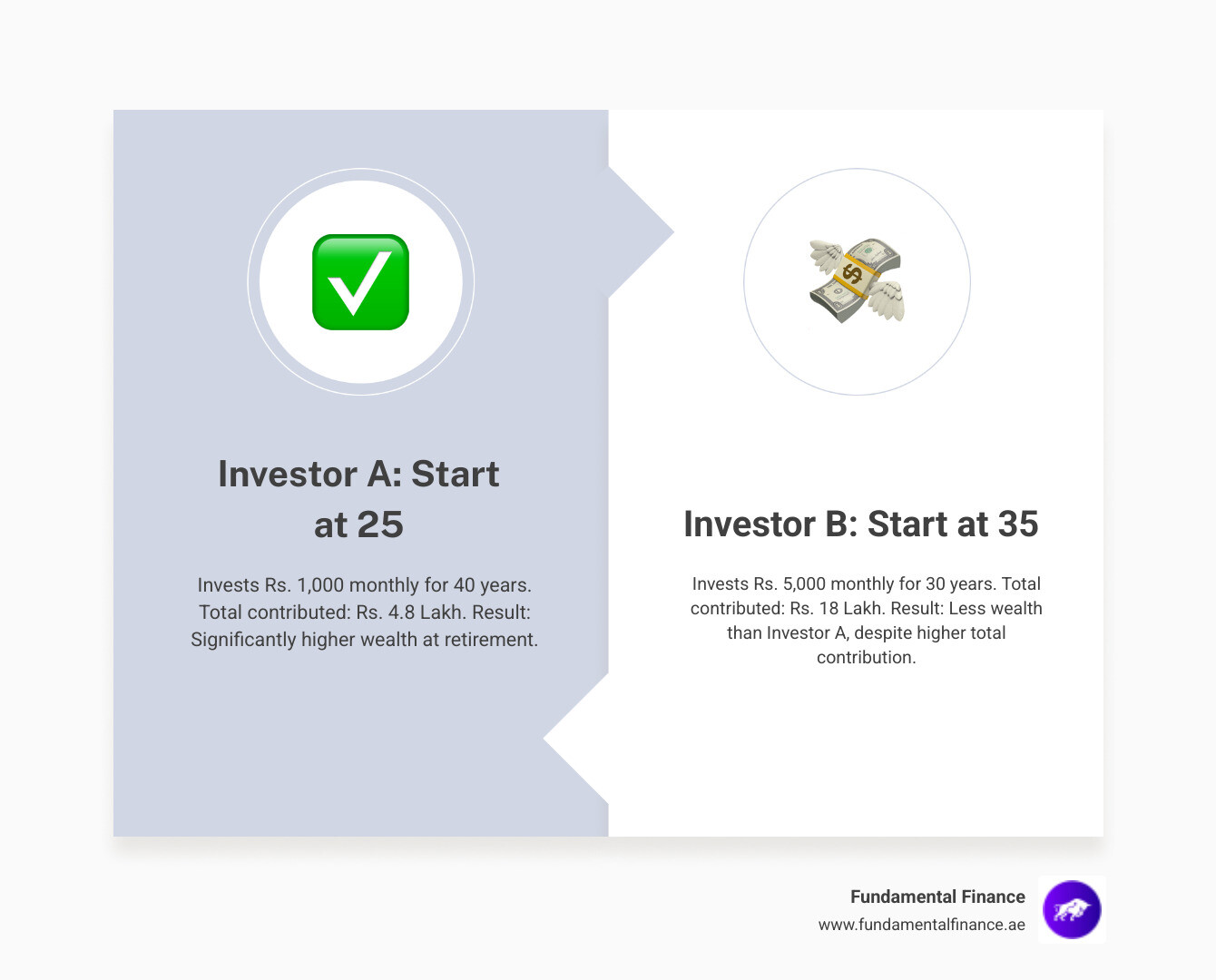Money Management at Every Age: How to Grow Your Wealth Over Time
Time to Read:
10

Your Lifelong Journey to Financial Freedom
Money Management at Every Age: How to Grow Your Wealth Over Time is about adapting your financial strategy as your life evolves. Your 20s require different money moves than your 50s, but the goal remains the same: building lasting wealth through smart, timely decisions.
Quick Answer: Essential Money Moves by Age
- 20s: Build credit, start an emergency fund, contribute to retirement (even small amounts).
- 30s: Increase your savings rate, buy life insurance, save for major goals like homeownership.
- 40s: Maximize retirement contributions, protect your earning power, plan for children's education.
- 50s+: Make catch-up contributions, plan your estate, prepare for healthcare costs.
The earlier you start, the more powerful your results. Thanks to compound growth, even Rs. 1,000 invested monthly in your 20s can outgrow Rs. 5,000/month started in your 30s.
Managing money isn't about having a lot of it; it's about developing the right habits at the right time. While core principles like spending less than you earn and investing for the long term never change, your priorities do shift. A 25-year-old should focus on building credit, while a 45-year-old needs to protect their family and maximize peak earning years.
Many people wait for the "perfect time" to get serious about money. The perfect time was yesterday. The second-best time is today. This guide shows you how to adapt and grow your wealth no matter where you are in life.

The Unchanging Pillars of Wealth: Core Principles for Any Age
This section covers the fundamental habits that form the bedrock of financial success, no matter your age or income. These principles are crucial for anyone looking to grow their wealth over time.
Master Your Cash Flow: Creating a Budget That Works
Effective Money Management at Every Age: How to Grow Your Wealth Over Time starts with a budget. Think of it as a map for your money, giving you control over your finances and building financial discipline. To start, track your spending for a month to understand your habits. Then, categorize expenses into "needs" (rent, groceries) and "wants" (dining out, entertainment) to find areas to save.
A popular guide is the 50/30/20 rule:
- 50% of your income for needs.
- 30% for wants.
- 20% for saving and investing.
This simple formula helps create a surplus for investments. Sticking to it takes practice, but tools like our Budget Calculator or a simple spreadsheet can help you gain control and build long-term financial stability.
The 'Pay Yourself First' Philosophy
The 'pay yourself first' philosophy is a golden rule for money management. Instead of saving what's left after spending, you prioritize saving by setting aside a portion of your income as soon as you get paid. This builds consistency and makes saving a non-negotiable habit.
Automate your savings! Set up automatic transfers from your checking to a dedicated savings account. This removes the temptation to spend and ensures your savings grow effortlessly.
A crucial part of this is building an emergency fund. Life is unpredictable, and unexpected costs like a job loss or medical emergency can derail your finances. Experts recommend saving three to six months of essential living expenses. This safety net provides immense financial security and peace of mind. A high-yield savings account (HYSA) is a great place for this fund, as it offers better interest rates than a standard account, helping your money grow faster.
The Dangers of Debt and Building a Strong Credit Score
Not all debt is equal. 'Good debt', like a home or student loan, can build wealth or increase earning potential. 'Bad debt', like high-interest credit card balances, can quickly erode your savings through compounding interest if not paid off monthly.
To manage debt and build a healthy credit score:
- Pay credit card bills in full each month to avoid interest.
- Use EMIs wisely for necessary purchases, not for wants that depreciate quickly.
- Tackle high-interest debt first. The financial benefit of clearing this debt often outweighs potential investment gains.
- Keep credit utilization below 30% of your total available credit.
- Pay all bills on time. Your payment history is a key factor in your credit score.
- Check your credit report regularly for errors and dispute any inaccuracies. Avoid opening too many new credit accounts at once.
The Power of Investing: Making Your Money Work for You

Once you're budgeting and managing debt, it's time to invest. Starting early, even with small amounts, is crucial for long-term wealth due to the magic of compounding. Compounding is when your investment returns begin to earn their own returns, creating exponential growth. Money invested early has more time to grow. For example, starting to save consistently at age 30 can lead to significantly more wealth by age 60 than saving double the amount starting at age 45. Even ₹500 per month from age 22 can build serious wealth.
Diversification is key to managing risk. Spreading your money across different investments—like stocks, bonds, and mutual funds—helps protect your portfolio. If one asset underperforms, others may balance it out. For new investors, low-cost, diversified options like index funds are a great starting point. It's also vital to understand your personal risk tolerance (comfort with market fluctuations) and time horizon (how long you plan to invest). Younger investors can typically take on more risk due to a longer time to recover from market dips.
Money Management at Every Age: How to Grow Your Wealth Over Time
Life is a journey, and your financial needs evolve with your goals. What works for a new graduate isn't ideal for someone planning retirement. This section explores how to adapt your strategy to build wealth effectively through every life stage, ensuring your Money Management at Every Age: How to Grow Your Wealth Over Time is smart and intentional.
Your 20s: Building the Foundation for Lifelong Wealth

Your 20s are a prime time for financial growth because you have time on your side. Thanks to compound interest, even small amounts saved now, like 100 AED a month, can grow into a substantial sum over decades.
This is the decade to build strong credit. Get a credit card and pay your bills on time, keeping your credit usage below 30% of your limit. It's also a great time to create a plan to pay down any student loans efficiently.
Make it a priority to start saving for retirement. If your employer offers a retirement plan with a match, contribute enough to get the full amount—it's free money. Also, diligently build your emergency fund in a high-yield savings account to protect yourself from unexpected costs.
Don't overlook insurance. Understanding disability insurance basics is vital to protect your income, as a surprising number of young adults may face a disability before retirement, according to Social Security disability facts. Make financial literacy a lifelong habit with resources like our Young Adult Finance guide. And when you're out with friends, our Tip Calculator makes splitting the bill easy!
Your 30s & 40s: How to Grow Your Wealth Over Time During Peak Earning Years
Your 30s and 40s are often your peak earning years, filled with milestones like career growth, starting a family, and buying a home. It's a crucial time to boost your financial strategy.
Beware of lifestyle creep—the tendency to increase spending as your income grows. Instead, channel pay raises toward savings and investments. If you start a family, "childproof" your finances by securing life insurance to protect their future. You should also start saving for your children's education, but remember to prioritize your own retirement savings first. There are loans for college, but not for retirement. You can also begin teaching your kids about money with resources like Teach Kids Finance.
Homeownership is a common goal. Factor in closing costs and maintenance, not just the mortgage payment. Continue to invest in your career to protect your earning power and use resources like our guide to Research career paths and salaries. Aim to maximize your retirement contributions, working toward saving 15% or more of your income.
Your 50s & Beyond: Protecting and Enjoying Your Wealth

In your 50s, the focus shifts from aggressive growth to protecting the wealth you've built. If you're 50 or older, take advantage of catch-up contributions to give your retirement accounts a final boost. It's also time for serious pre-retirement planning. Map out your retirement income and consider talking to a financial advisor.
Plan for healthcare costs in retirement, which can be substantial, and consider long-term care insurance. Revisit your estate planning by updating your will and establishing a power of attorney to ensure your assets are passed on as you wish. Many people also downsize their homes to free up equity and simplify their lifestyle. Finally, stay invested—even in retirement. A more conservative portfolio can help your money keep pace with inflation.
Smart Strategies and Common Pitfalls to Avoid
Beyond the basics, these advanced strategies and warnings can help you optimize your growth and sidestep common financial traps. Effective Money Management at Every Age: How to Grow Your Wealth Over Time involves both proactive planning and avoiding pitfalls.
Tax-Efficient Investing and Islamic Finance Principles
Smart investors focus on what they keep after taxes. A simple strategy is holding investments for over a year to benefit from lower long-term capital gains tax rates. Tax-advantaged accounts like 401(k)s and IRAs are powerful tools that shield your money from taxes, allowing it to grow more efficiently.
For our community in the UAE, understanding Islamic finance is key. Zakat obligations—an annual charity on wealth held for a full lunar year above the nisab threshold—are a vital part of this. It's a way to purify and redistribute wealth.
Halal investing is also crucial. This means avoiding industries like alcohol, tobacco, and conventional banking (which involves interest or riba) and focusing on Sharia-compliant investments that align with ethical values. It's entirely possible to build significant wealth while staying true to your principles.
Avoiding Common Money Mistakes on Your Wealth Journey
Most financial mistakes are avoidable once you know what to look for.
- Not starting early enough: Delaying your financial journey by even a few years can cost you significantly in potential wealth. The best time to start was yesterday; the next best time is today.
- Not setting clear goals: Vague goals like "I want to save money" are ineffective. Be specific: "I will save AED 50,000 for a down payment in 24 months."
- Emotional investing: Selling in fear or buying in greed destroys wealth. Stick to your long-term plan regardless of market noise.
- Lack of diversification: Putting all your money in one investment is risky. Spread your investments across different assets to protect your portfolio.
- Trying to time the market: Consistently buying and selling based on predictions rarely works. A consistent, long-term investing strategy is more effective.
- Ignoring insurance: Insurance protects your assets and future from unexpected disasters. Don't overlook health, life, disability, and property insurance.
- Not having a plan: Create a budget, set goals, automate your systems, and stick to the plan. Consistency is more important than perfection.
The Role of Automation and Professional Advice
Automation is like a financial assistant on autopilot. Set up automatic transfers to your savings and investment accounts to build wealth consistently without second-guessing your decisions. This removes decision fatigue and the temptation to spend.
Regularly tracking your finances with apps or spreadsheets keeps you accountable and helps you spot problems early. As your wealth grows, professional advice becomes more valuable. A financial advisor can help with complex investments, tax strategies, and major life events, providing an objective perspective.
At Fundamental Finance, we believe knowledge is your most powerful tool. The more you understand money, the better your decisions will be.
Frequently Asked Questions about Lifelong Money Management
What is the single most important rule for money management at every age?
The single most important rule for Money Management at Every Age: How to Grow Your Wealth Over Time is to spend less than you earn and consistently invest the difference. This simple principle is the foundation of all other financial strategies. It creates the surplus needed to build an emergency fund, pay off debt, and invest for your future. This rule works whether you're 22 or 52, and it's the key to building wealth over a lifetime.
How do I start investing if I have very little money?
You can absolutely start investing with very little money. The power of compound interest cares more about when you start and how consistent you are than how much you start with. Many mutual fund companies and micro-investing platforms allow you to begin with small amounts, sometimes as little as $25 or $50 a month through automatic contributions. The key is to start now with whatever you have. As your income grows, you can increase your contributions. Starting small is infinitely better than not starting at all.
How can I balance paying off debt with saving for the future?
Balancing debt repayment and saving depends on the type of debt. The general approach is to tackle high-interest debt aggressively first. If you have credit card debt with an 18% interest rate, paying it off provides a guaranteed 18% return on your money, which is hard to beat with investments.
However, don't completely ignore saving. It's wise to build a small emergency fund (perhaps one month's expenses) before aggressively paying down debt. This prevents you from going back into debt if an unexpected expense arises.
Once high-interest debt is gone, you can balance paying off lower-interest debt (like student loans or a mortgage) with investing for the future. Money Management at Every Age: How to Grow Your Wealth Over Time is about making smart decisions for your specific circumstances, not following rigid rules.
Conclusion: Take Control of Your Financial Future Today
Your journey to financial freedom is a lifelong adventure. The core ideas of Money Management at Every Age: How to Grow Your Wealth Over Time adapt as you move through life's chapters. From your 20s to retirement, the timeless pillars of budgeting, paying yourself first, managing debt, and investing wisely remain your most reliable companions.
We've covered how these strategies shift over the decades, along with smart tax planning, Islamic finance principles, and common pitfalls to avoid. The "perfect time" to get serious about your money is right now. Start small, stay consistent, and use the tools available to you.
Don't just dream about financial freedom—start building it today. We invite you to Start your financial education journey with us!
.avif)
Get Early Access
to Our Mobile App
Be among the first to explore FunFi, designed to make mastering money simple, practical, and fun!

.avif)